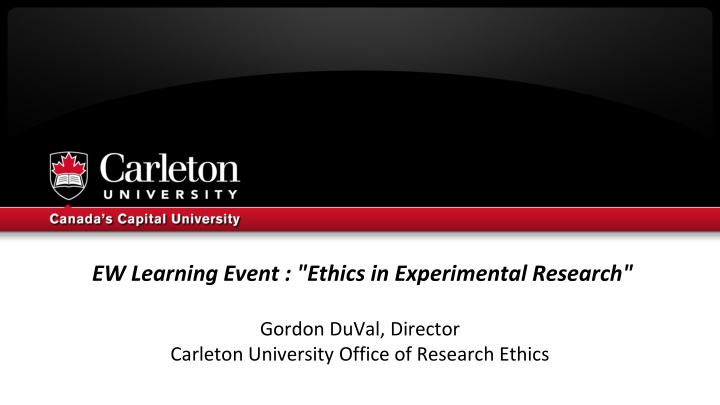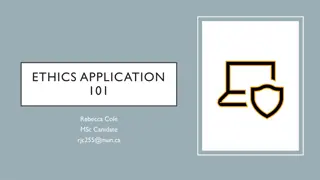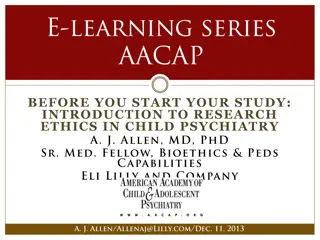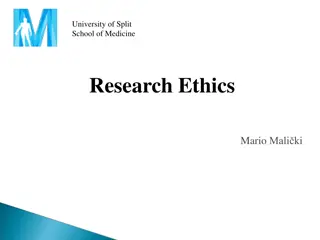Ethics in Experimental Research: Regulatory Requirements and Historical Context
This learning event delves into the ethical considerations surrounding experimental research, covering regulatory requirements, historical contexts of research wrongs, and the importance of Research Ethics Boards (REBs) in protecting participants. Explore the role of Tri-Council Policy Statement (TCPS) and privacy legislation in research, alongside significant historical events such as the Tuskegee Syphilis Study and the Nuu-chah-nulth blood samples case. Understand the ethical principles guiding research practices and the necessity of upholding participant autonomy, dignity, and fairness. Gain insights into why REBs are crucial in safeguarding against potential harms and injustices in research endeavors.
Download Presentation

Please find below an Image/Link to download the presentation.
The content on the website is provided AS IS for your information and personal use only. It may not be sold, licensed, or shared on other websites without obtaining consent from the author.If you encounter any issues during the download, it is possible that the publisher has removed the file from their server.
You are allowed to download the files provided on this website for personal or commercial use, subject to the condition that they are used lawfully. All files are the property of their respective owners.
The content on the website is provided AS IS for your information and personal use only. It may not be sold, licensed, or shared on other websites without obtaining consent from the author.
E N D
Presentation Transcript
EW Learning Event : "Ethics in Experimental Research" Gordon DuVal, Director Carleton University Office of Research Ethics
Regulatory Requirements Situating Federal Research Projects No comprehensive regulatory requirement for research review Role of Tri-Agencies Tri-Council Policy Statement (TCPS) https://ethics.gc.ca/eng/policy-politique_tcps2-eptc2_2018.html Voluntary adoption of TCPS by some agencies, eg Health Canada, National Research Council, DND Privacy Legislation 2
Historical Context Historical context of research wrongs: 1932-1972 Tuskegee Syphilis Study WWII - Nazi doctors experiments (Nuremberg Code) 1944-1974 US Human Radiation Experiments 1956-1972 Willowbrook State School, hepatitis study 1957-1964 Allen Memorial Institute, Montreal (CIA Project MK-ULTRA) 1963 Jewish Chronic Disease Hospital, Brooklyn 3
Historical Context Interview Study at Carleton You have failed so miserably in protecting my info I feel so ashamed and humiliated right now and cannot understand how you can be so callous and cruel with your handling of my information in this way Carleton University Research Participant (2014) 4
Historical Context Nuu-chah-nulth blood samples 1980s: BC Indigenous community participated in a study on rheumatoid arthritis -provided blood, hair and tissue to the study. Community was happy to help because of very high levels of arthritis in their community. The consent form only mentioned the arthritis study. Researcher moved to a new position in Salt Lake City- samples used in a publicly broadcast documentary (NOVA). The same DNA was used to determine how long Nuu-chah-nulth were in North America Challenged the community s understanding of their history and origin. Nuu-chah-nulth took legal action to return blood samples. 5
Why Do We Need REBs? Harms to research participants: Physical or emotional harms to research participants (risks) Indignity/disrespect (autonomy and self-determination) Injustice/unfairness (equal moral status) 6
Why Do We Need REBs? Why Do We Need REBs? Research can yield substantial benefits, but subjects (and others) risk harms when participating in research. There is the possibility of abuse or exploitation of research subjects in attempting to realize the benefits of clinical research. To manage the conflict between benefit to society and burden to research participants, some ethical framework is needed. 7
Why Do We Need REBs? Why require independent review (by an REB)? Researchers are subject to conflicts that may skew their own objectivity: o Financial interests o Professional advancement o Academic prestige o Personal religious/cultural/other beliefs o Excitement about the project desire to make a difference 8
Research Ethics Principles Respect for Persons - Promoting respect and dignity: Informed consent Respect for private information Respectful treatment (eg courtesy, truth-telling, promise-keeping, notifying of research findings) 9
Research Ethics Principles Welfare - Protecting from harm (and maximizing benefit) Physical harms Emotional/psychological harms Confidentiality/privacy harms Stigmatization or other harms to groups 10
Research Ethics Principles Justice and Fairness: Respect for Equal Moral Status Participants should share the burdens and benefits of research equitably. o No one unfairly excluded from potentially beneficial research (even vulnerable persons). o No groups unfairly over-included in risky research. 11
Welfare of Research Participants Risk/benefit analysis favourable balance of risks and potential benefits minimize harms maximize benefits, where possible 12
Recruitment Undue influence and manipulation - recruitment by individuals in a position of authority Power relationships: e.g. employers and employees, students Influential relationships: family, friends, professional colleagues Unethical access to contact information. 13
Free and Informed Consent Information what a reasonable person would need to know to decide reasonable opportunity to ask questions and consider decision Language of consent is accessible to the participant group Comprehension capacity and ability to communicate a choice Voluntariness no undue influence 14
Vulnerable Populations Vulnerable populations Concern is to protect free and informed decision-making. Vulnerability is often caused by limited decision-making capacity, or limited access to social goods, such as rights, opportunities and power. Vulnerable groups may include children, prisoners, marginalized groups in society, persons with mental illness and persons subject to authority or influence.
Confidentiality/Privacy Confidentiality/Privacy Consent to collection, use, and disclosure Identifiability of personal information o Identifiable o Coded o De-identified (anonymized) Planned disclosure of identifiable personal information Security of documents and data Possibility of accidental or deliberate disclosure 16























